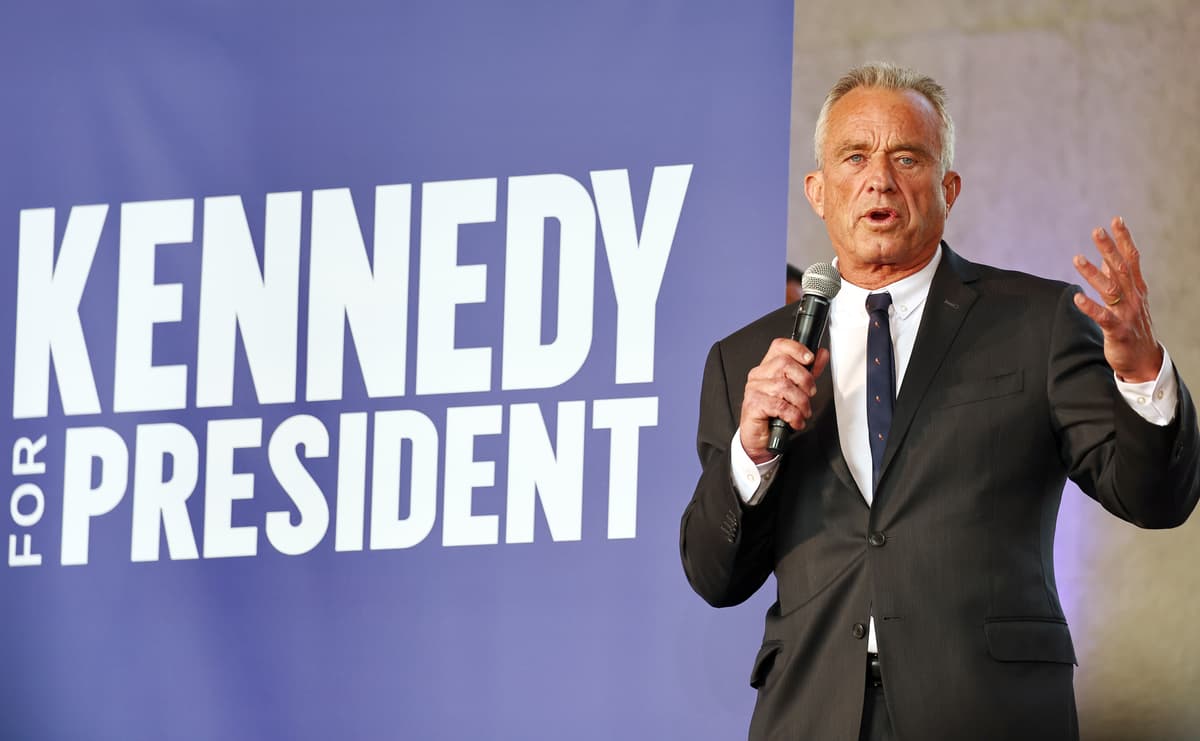RFK Jr. Says He’d Consider Adding Safe Using Sites to His Sweeping Proposal To Tackle Drug Crisis
‘I would try anything that works … and if they don’t work, we’ll try something else,’ the independent presidential candidate tells the Sun.

Independent presidential candidate Robert F. Kennedy Jr. is proposing a New Deal-scale program to tackle the nation’s drug crisis that includes a heterodox mix of policies from both left and right, including weighing the benefits of harm reduction.
In an interview with the Sun, Mr. Kennedy, who is a recovering heroin addict, said he would even be open to safe drug consumption sites to protect the users — if the data shows they work. He says he hasn’t looked into it yet.
“I would try anything that works, and I think we ought to do what Franklin Roosevelt said during the New Deal, let’s try things. And if they don’t work, we’ll try something else,” Mr. Kennedy tells the Sun.
Mr. Kennedy’s signature drug policy proposal is to build “hundreds of healing farms” across the country, where drug addicts can go to commune with nature, work the land, learn a trade, and heal physically and spiritually. Mr. Kennedy says these recovery farms will be paid for with a federal tax on marijuana.
“It’s reminiscent of the Works Progress Administration in the New Deal, but directed towards healing, towards rebuilding community,” Mr. Kennedy tells the Sun.
Unconstrained by partisan orthodoxy on how to speak about the nation’s drug crisis, Mr. Kennedy is offering bold solutions that cherry-pick policies from both left and right. He favors marijuana and psychedelic drug decriminalization. He acknowledges that the War on Drugs has failed.
Despite the backlash to harm reduction on the right and from moderates at cities like San Francisco and Portland that are dealing with rampant public drug use, Mr. Kennedy says he is open to those policies. He also supports using the criminal justice system to nudge drug addicts into treatment — a heresy to the progressive left.
“I’ve seen it work,” he says, citing his own arrest that brought him into recovery 40 years ago. “That’s what saved me.”
“It works in Holland,” he adds, calling the Dutch model the gold standard for how to reduce overdose deaths and clean up city streets with a combination of police enforcement, robust social services, and a focus on harm reduction and recovery. Once a heroin capital, Amsterdam now boasts far fewer overdose deaths a year than San Francisco or Philadelphia.
The Kennedy campaign will premiere a 45-minute documentary, “Recovering America,” Saturday at Albuquerque, which follows Mr. Kennedy as he searches for solutions to the country’s drug crisis.
The film, which the Sun previewed, starts at San Francisco with the fentanyl crisis in open view, persons passed out on the sidewalk. He profiles a drug court at Miami, a recovery program in Utah, and a “healing farm” prototype in Texas.
“America lost about 3,000 people on 9/11, and we launched an $8 trillion War on Terror in response. We’re losing 30 times that number every year to drug overdoses and we hardly do anything about it,” Mr. Kennedy says. “I’m going to change that.”
Mr. Kennedy’s proposals may be light on details, but for a crisis that is now killing more than 107,000 Americans each year, he’s at least offering something new. It’s also good politics.
More than 45 million Americans suffer from substance abuse disorder, according to the Department of Health and Human Services, and more than half of all Americans say they have a family member who suffers from it.
President Trump prevailed in 2016 by winning in counties with the highest overdose death rates. President Biden won praise after the first presidential debate in 2020 by defending Hunter against Trump’s attacks.
“My son, like a lot of people you know at home, had a drug problem,” Mr. Biden said. “He’s overtaken it. He’s fixed it. He’s worked on it. And I’m proud of him.”
Mr. Kennedy is open about his past struggles with drugs. He tells the Sun he goes to nine 12-step meetings a week. “I don’t like going to meetings. I never do,” he says. “I go because the rest of my life works, and it keeps me peaceful inside of myself.”
Mr. Kennedy is polling higher in several swing states than the difference between Mr. Biden and Trump. A handful of these states, which will decide the election, have among the nation’s highest overdose death rates. Among these are Arizona, Pennsylvania, and North Carolina.
“I appreciate that a presidential candidate on the national stage is talking about the drug crisis in this way,” a formerly homeless fentanyl addict-turned-recovery advocate at San Francisco, whom the film interviews, Tom Wolf, tells the Sun.
“We did the War on Drugs thing. It didn’t work out too good,” he says. “The last decade we focused on harm reduction and decriminalization, and it hasn’t worked out either. Look at the data. So it’s really the answer lies somewhere in the middle.”
Mr. Kennedy can’t say how much a federal marijuana tax will yield or how much the “healing farms” will cost. He says the federal government will purchase the land and take bids from NGOs to run the programs.
With his libertarian distrust of government and health bureaucracies, he acknowledges that a government program — a New Deal for recovery — runs the risk of becoming an inefficiently run, ineffective, and corrupt program that’s impossible to terminate.
“I think it’s a foundational issue to making these work that they’re funded by the government but are not government run,” Mr. Kennedy says of the “healing farms.” He says they should ideally be “public-private partnerships” that undergo “very rigid auditing.”
Mr. Kennedy may get a chance to talk about his drug policy proposals at a CNN debate later this month — if he qualifies and Mr. Biden and Trump are willing to face him. Those are big if’s.
Mr. Kennedy is on the ballot in eight states and has collected enough signatures in another 13, according to his campaign. This means he could theoretically win 270 electoral votes, a requirement of CNN.
Mr. Kennedy has filed a complaint with the Federal Elections Commission over CNN’s debate qualification criteria. He says the FEC told a journalist that “presumptive nominee” is not a recognized criteria to skirt ballot requirements.
“If CNN goes forward and uses it as their criteria now that the FEC has said that, they will be making an illegal campaign contribution,” Mr. Kennedy says. “They will be guilty of the same crime that got Michael Cohen locked in jail. I don’t think they’re going to do it.”

